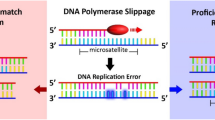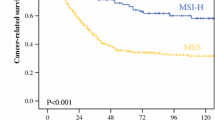Abstract
The clinical significance of low-frequency microsatellite instability (MSI-L) in gastric cancer (GC) has not been well established. The aim of this study was to evaluate the clinicopathological features of MSI-L in GC. We investigated microsatellite instability (MSI) in 5 di-nucleotide repeat sequences in 210 unselected GC patients. High-resolution fluorescent microsatellite analysis assay was utilized to detect MSI. Clinicopathological variables were compared among groups with different microsatellite statuses. The overall survival (OS) was analyzed by Kaplan–Meier method. Multivariable analysis was performed to identify prognostic factors and variables correlated with lymph node metastasis. High-frequency microsatellite instability (MSI-H), MSI-L, and microsatellite stable were identified, respectively, in 10.5, 10.0, and 79.5 % of unselected GC cases. Tumors with MSI-H were less invasive, and these patients showed a better OS. MSI-L was correlated with more advanced tumor Node Metastasis stage, and more frequent lymph node metastasis. The unfavorable prognosis predicted by MSI-L was ascribed to its correlation with lymphatic invasion. MSI-L characterized by di-nucleotide markers represents a distinct subcategory of GC with aggressive clinicopathological features, which are particularly affiliated to lymphatic system and correlated with a poor prognosis. MSI-L could be beneficial for predicting the clinical outcome of GC.

Similar content being viewed by others
References
Jemal, A., Bray, F., Center, M. M., Ferlay, J., Ward, E., & Forman, D. (2011). Global cancer statistics. CA: A Cancer Journal for Clinicians, 61, 69–90.
Boland, C. R., Thibodeau, S. N., Hamilton, S. R., Sidransky, D., Eshleman, J. R., Burt, R. W., et al. (1998). A National Cancer Institute workshop on microsatellite instability for cancer detection and familial predisposition: Development of international criteria for the determination of microsatellite instability in colorectal cancer. Cancer Research, 58, 5248–5257.
Leach, F. S., Nicolaides, N. C., Papadopoulos, N., Liu, B., Jen, J., Parsons, R., et al. (1993). Mutations of a mutS homolog in hereditary nonpolyposis colorectal cancer. Cell, 75, 1215–1225.
Suzuki, H., Itoh, F., Toyota, M., Kikuchi, T., Kakiuchi, H., Hinoda, Y., et al. (1999). Distinct methylation pattern and microsatellite instability in sporadic gastric cancer. International Journal of Cancer, 83, 309–313.
Laiho, P., Launonen, V., Lahermo, P., Esteller, M., Guo, M., Herman, J. G., et al. (2002). Low-level microsatellite instability in most colorectal carcinomas. Cancer Research, 62, 1166–1170.
Tomlinson, I., Halford, S., Aaltonen, L., Hawkins, N., & Ward, R. (2002). Does MSI-low exist? Journal of Pathology, 197, 6–13.
Jass, J. R. (2007). Classification of colorectal cancer based on correlation of clinical, morphological and molecular features. Histopathology, 50, 113–130.
Kohonen-Corish, M. R., Daniel, J. J., Chan, C., Lin, B. P., Kwun, S. Y., Dent, O. F., et al. (2005). Low microsatellite instability is associated with poor prognosis in stage C colon cancer. Journal of Clinical Oncology, 23, 2318–2324.
Kim, H., An, J. Y., Noh, S. H., Shin, S. K., Lee, Y. C., & Kim, H. (2011). High microsatellite instability predicts good prognosis in intestinal-type gastric cancers. Journal of Gastroenterology and Hepatology, 26, 585–592.
Falchetti, M., Saieva, C., Lupi, R., Masala, G., Rizzolo, P., Zanna, I., et al. (2008). Gastric cancer with high-level microsatellite instability: Target gene mutations, clinicopathologic features, and long-term survival. Human Pathology, 39, 925–932.
Sakurai, M., Zhao, Y., Oki, E., Kakeji, Y., Oda, S., & Maehara, Y. (2007). High-resolution fluorescent analysis of microsatellite instability in gastric cancer. European Journal of Gastroenterology and Hepatology, 19, 701–709.
Kanemitsu, K., Kawasaki, K., Nakamura, M., Li, D., Yasuda, T., Kuroda, D., et al. (2007). MSI is frequently recognized among gastric cancer patients with a family history of cancer. Hepato-Gastroenterology, 54, 2410–2414.
Leite, M., Corso, G., Sousa, S., Milanezi, F., Afonso, L. P., Henrique, R., et al. (2011). MSI phenotype and MMR alterations in familial and sporadic gastric cancer. International Journal of Cancer, 128, 1606–1613.
Beghelli, S., de Manzoni, G., Barbi, S., Tomezzoli, A., Roviello, F., Di Gregorio, C., et al. (2006). Microsatellite instability in gastric cancer is associated with better prognosis in only stage II cancers. Surgery, 139, 347–356.
Sepulveda, A. R., Santos, A. C., Yamaoka, Y., Wu, L., Gutierrez, O., Kim, J. G., et al. (1999). Marked differences in the frequency of microsatellite instability in gastric cancer from different countries. American Journal of Gastroenterology, 94, 3034–3038.
Kang, J. U., & Koo, S. H. (2011). Assessment of the beneficial loci and prognostic implications of microsatellite instability in gastric carcinoma. Molecular Medicine Report, 4, 1175–1181.
Yamamoto, H., Itoh, F., Fukushima, H., Adachi, Y., Itoh, H., Hinoda, Y., et al. (1999). Frequent Bax frameshift mutations in gastric cancer with high but not low microsatellite instability. Journal of Experimental and Clinical Cancer Research, 18, 103–106.
Corso, G., Pedrazzani, C., Marrelli, D., Pascale, V., Pinto, E., & Roviello, F. (2009). Correlation of microsatellite instability at multiple loci with long-term survival in advanced gastric carcinoma. Archives of Surgery, 144, 722–727.
Fang, D. C., Jass, J. R., Wang, D. X., Zhou, X. D., Luo, Y. H., & Young, J. (1999). Infrequent loss of heterozygosity of APC/MCC and DCC genes in gastric cancer showing DNA microsatellite instability. Journal of Clinical Pathology, 52, 504–508.
Vauhkonen, M., Vauhkonen, H., Sajantila, A., & Sipponen, P. (2005). Differences in genomic instability between intestinal- and diffuse-type gastric cancer. Gastric Cancer, 8, 238–244.
Pinto, M., Oliveira, C., Machado, J. C., Cirnes, L., Tavares, J., Carneiro, F., et al. (2000). MSI-L gastric carcinomas share the hMLH1 methylation status of MSI-H carcinomas but not their clinicopathological profile. Laboratory Investigation, 80, 1915–1923.
Gazvoda, B., Juvan, R., Zupanic-Pajnic, I., Repse, S., Ferlan-Marolt, K., Balazic, J., et al. (2007). Genetic changes in Slovenian patients with gastric adenocarcinoma evaluated in terms of microsatellite DNA. European Journal of Gastroenterology and Hepatology, 19, 1082–1089.
Sano, T. (2010). Evaluation of the gastric cancer treatment guidelines of the Japanese Gastric Cancer Association. Gan to Kagaku Ryoho, 37, 582–586.
Oda, S., Oki, E., Maehara, Y., & Sugimachi, K. (1997). Precise assessment of microsatellite instability using high resolution fluorescent microsatellite analysis. Nucleic Acids Research, 25, 3415–3420.
Umar, A., Boland, C. R., Terdiman, J. P., Syngal, S., de la Chapelle, A., Rüschoff, J., et al. (2004). Revised Bethesda guidelines for hereditary nonpolyposis colorectal cancer (lynch syndrome) and microsatellite instability. Journal of the National Cancer Institute, 96, 261–268.
Xicola, R. M., Llor, X., Pons, E., Castells, A., Alenda, C., Piñol, V., et al. (2007). Performance of different microsatellite marker panels for detection of mismatch repair-deficient colorectal tumors. Journal of the National Cancer Institute, 99, 244–252.
Asaka, S., Arai, Y., Nishimura, Y., Yamaguchi, K., Ishikubo, T., Yatsuoka, T., et al. (2009). Microsatellite instability-low colorectal cancer acquires a KRAS mutation during the progression from Dukes’ A to Dukes’ B. Carcinogenesis, 30, 494–499.
Kets, C. M., Hoogerbrugge, N., Bodmer, D., Willems, R., Brunner, H. G., van Krieken, J. H., et al. (2006). Unfavorable pathological characteristics in familial colorectal cancer with low-level microsatellite instability. Modern Pathology, 19, 1624–1630.
Halford, S. E., Sawyer, E. J., Lambros, M. B., Gorman, P., Macdonald, N. D., Talbot, I. C., et al. (2003). MSI-low, a real phenomenon which varies in frequency among cancer types. Journal of Pathology, 201, 389–394.
Jass J. R., Whitehall V. L., Young J., Leggett B., Meltzer S. J., Matsubara N., et al. (2002). Correspondence re: P. Laiho et al. Low-level microsatellite instability in most colorectal carcinomas. Cancer Research, 62, 5988–5989.
Plaschke, J., Preußler, M., Ziegler, A., & Schackert, H. K. (2012). Aberrant protein expression and frequent allelic loss of MSH3 in colorectal cancer with low-level microsatellite instability. International Journal of Colorectal Disease, 27, 911–999.
Vladimirova, V., Denkhaus, D., Soerensen, N., Wagner, S., Wolff, J. E., & Pietsch, T. (2008). Low level of microsatellite instability in pediatric malignant astrocytomas. Neuropathology and Applied Neurobiology, 34, 547–554.
Imai, K., & Yamamoto, H. (2008). Carcinogenesis and microsatellite instability: The interrelationship between genetics and epigenetics. Carcinogenesis, 29, 673–680.
Campregher, C., Scharl, T., Nemeth, M., Honeder, C., Jascur, T., Boland, C. R., et al. (2010). The nucleotide composition of microsatellites impacts both replication fidelity and mismatch repair in human colorectal cells. Human Molecular Genetics, 19, 2648–2657.
Oda, S., Maehara, Y., Ikeda, Y., Oki, E., Egashira, A., Okamura, Y., et al. (2005). Two modes of microsatellite instability in human cancer: differential connection of defective DNA mismatch repair to dinucleotide repeat instability. Nucleic Acids Research, 33, 1628–1636.
Thibodeau, S. N., Bren, G., & Schaid, D. (1993). Microsatellite instability in cancer of the proximal colon. Science, 260, 816–819.
Zhao, Y., Miyashita, K., Ando, T., Kakeji, Y., Yamanaka, T., Taguchi, K., et al. (2008). Exclusive KRAS mutation in microsatellite-unstable human colorectal carcinomas with sequence alterations in the DNA mismatch repair gene, MLH1. Gene, 423, 188–193.
Karran, P., & Bignami, M. (1996). Drug-related killings: A case of mistaken identity. Chemistry & Biology, 3, 875–879.
Acknowledgments
We sincerely thank Dr. Shinya Oda, Dr. Eiji Oki, Prof. Yoshihiro Kakeji, Prof. Zhiwei Zhou, Prof. Huimian Xu, and Prof. Qiang Wang for providing critical comments on our manuscript. We offer our sincere gratitude to Prof. Yoshihiko Maehara for his generous support. The current study was supported by “Liaoning BaiQianWan Talents Program” #2010921037, a grant from the National Ministry of Human Resources and Social Security of China #2011LX005, and the National Science Foundation of Liaoning Province, China #201102110.
Author information
Authors and Affiliations
Corresponding author
Rights and permissions
About this article
Cite this article
Zhao, Y., Zheng, ZC., Luo, YH. et al. Low-Frequency Microsatellite Instability in Genomic Di-Nucleotide Sequences Correlates with Lymphatic Invasion and Poor Prognosis in Gastric Cancer. Cell Biochem Biophys 71, 235–241 (2015). https://doi.org/10.1007/s12013-014-0189-9
Published:
Issue Date:
DOI: https://doi.org/10.1007/s12013-014-0189-9




